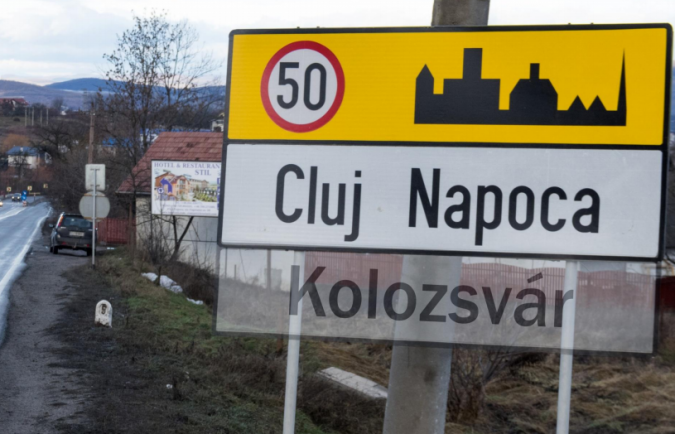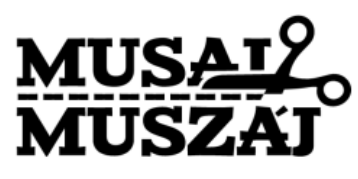The Hungarian Free Press has covered the efforts of an activist group in Kolozsvár (Cluj-Napoca), called Musai/Muszáj, to make the cultural capital of this multiethnic region of Romania more bilingual–at least in terms of encouraging the local government to allow for bilingual (Romanian/Hungarian) place name and street signs. András Bethlendi, a lawyer and activist with Musai/Muszáj, shared with our site their English-language case study on how a group of devoted activists has been applying pressure on Kolozsvár officials to finally embrace multilingualism and the city’s multiculturalism heritage.

Signs at Kolozsvár/Cluj city limits are currently unilingual (in Romanian only). Hungarian activists are calling for bilingual signs, and this is how they imagine one would look like…
Demographic background
Cluj-Napoca/Kolozsvár is the 2nd biggest city of Romania and it is the cultural and economical centre of Transylvania. The town has a long history of multiculturalism, where Hungarians, Romanians, Germans and Jews have lived together during long centuries. While in the 1960- 1970’s, the town’s Hungarian population represented 42 percent of the total population, as the result of rapid industrialization and communist government-orchestrated integral migration of ethnic Romanians from other regions of the country, the ethnic composition of the city has been changed drastically within the last 40 years. (1) Due to the former communist regime’s strategy that had the aim to change the ethnic composition of the town, the population of the town has tripled in less than thirty years, and today the Hungarian community consists 16% of the total population however Cluj-Napoca/Kolozsvár is the home of the 2nd biggest Hungarian community
(approx. 50.000 people) of Romania. (2)
Musai-Muszáj Advocacy Group
The Musai-Muszáj movement is a grassroots advocacy initiative founded in 2015 by local activists in order to promote multiculturalism and multilingualism in the town of Cluj-Napoca/Kolozsvár. Despite the town’s strong multicultural and multilingual character, the Mayor’s office and the local decision makers are strongly opposed to the public use of Hungarian language. While the Mayor of Cluj-Napoca/Kolozsvár claims that he strongly supports multiculturalism and multilingualism, in reality the Mayor’s office general policy alongside with the attitude of the public servants show a very different reality and sadly demonstrates the opposite. Even though the Law on Public Administration clearly states that it is the obligation of the Mayor’s office to place the settlement name in bilingual format in localities where there is a significant presence of an ethnic minority (in our case the Hungarian community), the local administration has been steadfast in refusing to include Hungarian on the city’s official place name signs.
The name ‘Musai-Muszáj’ is the Romanian/Hungarian bilingual translation of the word ‘must’, both originated from the German ‘muss sein’ pointing out our group’s claim for the town’s multilingualism. The logo of our movement became the scissor due to a very unfortunate story happened in our town in the summer of 2014. Local activists have changed a monolingual banner including the name and logo of the city. This banner has been placed in the central park of the town where the official wedding ceremonies are held by the Mayor’s office. When the representatives of City Hall have realized that the banner has been changed from monolingual to bilingual, however the characters and the logo has been identical to the ones from the monolingual banner, a number of public servants have cut off with a scissor the Hungarian text. (3)
Due to this unhappy incident that proves the intolerant attitude of the Mayor’s office towards the use of the Hungarian language in public spaces, our advocacy group has chosen the scissor as the symbol of our Movement. For today the Musai-Muszáj movement and its logo became the symbol of civil advocacy actions for multilingualism and fight for tolerance and mutual respect in Cluj-Napoca/Kolozsvár. Our group became well-known because of its creative awareness-rising actions and multilingual communication which managed to involve not only Hungarians but also Romanians in the campaign – our Facebook community numbering more than 10.000 members already. (4)
The Lawsuit for bilingual place-name signs and the reaction of the Mayor’s office
Given that in Cluj-Napoca/Kolozsvár the local authorities and the Court are ignoring the prescriptions of art. 131 and art. 76 of Law No. 215/2001, and during the last 15 years no bilingual place-name signs have been installed at the entrances/exits of the town till present, our advocacy group has decided to take steps in order to solve this long lasting illegality. Our project called ‘Bilingual place-name signs in Cluj-Napoca/Kolozsvár’ has been initiated in February 2015 as a joint operation with an NGO from Cluj/Kolozsvár called Minority Rights. In February 2015, the NGO called Minority Rights has initiated a lawsuit against the Mayor’s Office of Cluj-Napoca/Kolozsvár requesting the installation of the missing multilingual placename signs. Parallel to the legal action, our advocacy group started an awareness raising campaign with the aim to include in the lawsuit as many plaintiffs as possible. Given that under Romanian law, class actions are not expressly regulated, the Civil Procedural Code encourages group actions considering the governing of institutions, such as joint litigations. We have chosen to start a joint litigation and in our case the counterpart of the petition that has sued the Mayor’s Office has been the already mentioned Minority Rights NGO. Thanks to our efficient campaign we have managed to include 371 citizens in the lawsuit and within 6 months more than 2700 persons individually filed official requests (formulated by us) claiming multilingual place name
signs. (5)
Despite the existence of legal provisions and obvious demand, the mayor of the city has rejected all the requests and the Court has considered the claim ‘unjustified’. (6) The lawsuit has started in Cluj-Napoca/Kolozsvár on 27 March, 2015 and the Tribunal’s decision has been pronounced on 15 February 2016. The number of the Court File is: 1535/117/2015.
Legal regulation of multilingual place-name signs
It is important to mention that the following legal regulations and international treaties, although prescribe clearly the obligation of local authorities to install bilingual place-name signs, have not been fully taken in consideration and have been misinterpreted by the Tribunal of ClujNapoca/Kolozsvár
and the Mayor’s Office.
- Based on Romanian laws the use of national minority languages in public administration (forexample, the posting of bilingual road signs) is granted in settlements where minorities exceed 20% of the population. According to art. 1317 and art. 768 of Law No. 215/2001, Romanian local authorities ‘assure’ the inscription of localities on the mother tongue of national minorities even if for various reasons after the entry into force of this law (23.05.2001), the percentage of citizens belonging to the respective national minority falls below the 20% threshold.The Mayor’s Office has ignored to reflect on art. 131 of Law No. 215/2001 in its answers to the more than 2700 requests. (7), (8).
- Cluj-Napoca/Kolozsvár is the home of the 2nd biggest Hungarian community of Romania. When the aforementioned Law on Local Public Administration No. 215/2001 entered in force, theHungarian community numbered 74871 persons, which represented the 23% of the total population of the city based on official census. Government Decision No. 1206/2001 (currently mandatory) also contains the list of localities which shall ‘assure’ multilingual place-name signs mentioning the place-name: ‘Cluj-Napoca/Kolozsvár’ (Romanian and Hungarian names of the city).
- The given decision of the Tribunal of Cluj-Napoca/Kolozsvár proves that the court did not take in consideration neither the percentage of the valid census based on what the Hungarians represented 23% of the total population in the year when the law on local Public Administration entered in force nor the significance of the Government Decision No. 1206/20019 although the argumentation of the court was not published yet.
- Furthermore, according to the art. 11 par. 3 of the Framework Convention for the Protection of National Minorities signed by Romania: ‘In areas traditionally inhabited by substantial numbers of persons belonging to a national minority, the Parties shall endeavour, […] to display traditional local names, street names and other topographical indications intended for the public also in the minority language when there is a sufficient demand for such indications.’ The fact that Tribunal of Cluj-Napoca/Kolozsvár considers that 50.000 Hungarians, 2700 requests and 371 plaintiffs do not represent a sufficient demand is the evidence of misinterpretation of the Framework Convention.
Final notes
Even though the Mayor’s office rejects to install multilingual place-name signs and the
Court has considered our claim ‘unjustified’:
- Emil Boc, former prime minister, present mayor of Cluj-Napoca/Kolozsvár claims to act as the mayor of a ‘modern, multicultural city with a European mentality and a democratic framework where many different groups live together in harmony.’ (10) on international forums, while fighting against multilingualism on court, meanwhile no law prohibits the installation of multilingual place-name signs in Romania in any case quite the contrary! The city hall rejects to install multilingual place-name signs but applies for the title of ‘European Capital of Culture in 2021’ suggesting in its application that multiculturalism and multilingualism consist the priorities of the institution, yet the reality is the quite the opposite (11)
- The Government of Romania on 1st of February 2016 has answered to the recommendation of the Advisory Committee in its 4th state report on the implementation of the multilateral treaty of the Council of Europe, the Framework Convention For The Protection Of National Minorities: ‘In the event of an unfavorable demographic evolution, if the share of a given minority population falls below the threshold of 20%; they will enjoy the most favorable linguistic status granted by the Law no. 215/2001 (art. 131 of the aforementioned law, republished on 29 February 2007).’ (12)
This misleading statement is repeated identically in the 2nd periodical state report on the implementation of the European Charter for Regional or Minority Languages submitted on 2 March 2016 by the Government of Romania.13
Despite the unsuccessful result of the lawsuit we will continue our struggle for the bilingual
place-name signs. Now we are waiting for the argumentation of the Tribunal in order to appeal against the court’s decision. We will continue our advocacy actions and we will keep you updated.
Thank you for reading our case study.
Respectfully,
András Bethlendi
Lawyer, activist of the Musai-Muszáj Advocacy Group
Notes
(1) Varga E. Árpád: “Erdély etnikai és felekezeti statisztikája (1850–1992)” (in Hungarian). Retrieved 2016-03-12.
(2) “Populația stabilă după etnie – județe, municipii, orașe, comune”. National Institute of Statistics. 5 July 2013. Retrieved 2016-03-12.
(3) Article about the case: http://www.stiridecluj.ro/social/inscriptie-in-limba-maghiara-amplasata-ilegal-in-parculcentral-
foto Retrieved 2016-03-12.
(4) https://www.facebook.com/musaimuszaj
(5) http://portal.just.ro/117/SitePages/Dosar.aspx?id_dosar=11700000000104379&id_inst=117
(6) http://portal.just.ro/117/SitePages/Dosar.aspx?id_dosar=11700000000104379&id_inst=117
(7) http://legeaz.net/legea-215-2001-actualizata/art-131
(8) http://legeaz.net/legea-215-2001-actualizata/art-76
(9) http://lege5.ro/Gratuit/gm2denjt/norma-de-aplicare-a-dispozitiilor-privitoare-la-dreptul-cetatenilor-apartinandunei-minoritati-nationale-de-a-folosi-limba-materna-in-administratia-publica-locala-cuprinse-in-legeaadministratiei-publ?d=2016-03-12
(10) http://www.european-times.com/sector/government/emil-boc/ Retrieved 2016-03-12
(11)http://www.capitalaculturala2021.ro/Files/dosare/cluj%20napoca/ClujNapoca%202021_Application%20form%20ECoC_english%20version.pdf Retrieved 2016-03-12.
(12) Fourth Report Submitted By Romania Pursuant To Article 25, Paragraph 2 Of The Framework Convention For The Protection Of National Minorities, p. 41. https://rm.coe.int/CoERMPublicCommonSearchServices/DisplayDCTMContentdocumentId=0900001680595fbf




